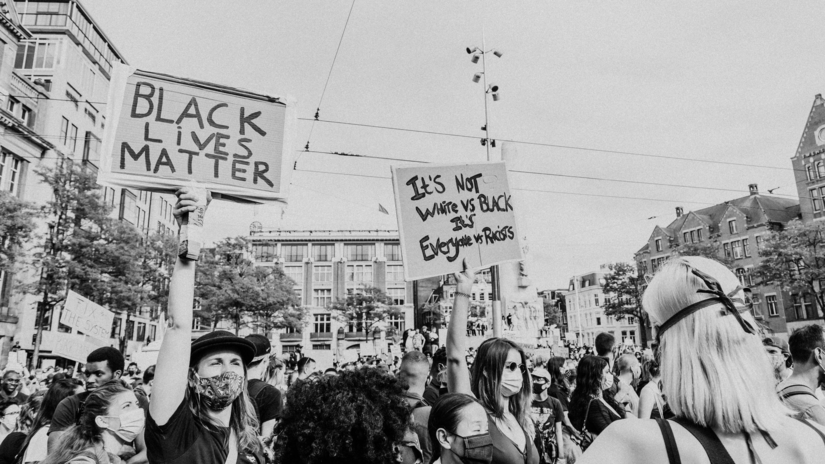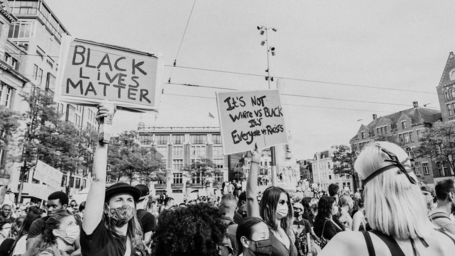Almost four months on from George Floyd’s death the topic of black lives matter is as important as ever. While the posting on social media has noticeably slowed down, it is the conversations that we have behind closed doors that matter most. Education starts first and foremost with those around us and that is why it’s important to keep talking about racial inequality with our friends and families, the more we talk the more we learn.
Tobi Lawal, Felicia Olusanya (Felispeaks), and Amanda Adewole all sat down to discuss ‘black lives matter’ and their experience of racism in Ireland at the Galway international arts festival, they were hosted on a panel led by Róisín Ingle, an Irish times journalist.
A key point made by Amanda Adewole was that “Racism in Ireland is the same as America, it is just manifested in a different way”, it is still rooted in hate, it does not matter how overt the act is, racism is racism. The fact that a black man had to be executed on camera by an officer of the law just to start the conversation of racism is a terrifying reflection of our society. George Floyd was not a wake-up call, racism has existed since we as white people began using black people as slaves, we have just chosen to ignore it. Being ignorant is not an option, for black people, this is their reality.
It is evident there is a lack of awareness as to what racism is, it is not shouting the N-word as a black person passes, it takes on many forms, a big one being microaggressions. Amanda Adewole explained “it (microaggressions) takes away your sense of self, your sense of self-identity” it creates a feeling of being othered. Different types of microaggressions are:
-
Microinvalidations – denying or attacking the experiences, feelings, or thoughts black and POC (people of colour) have ie. “I don’t see colour” “all lives matter”
-
Microinsults – Verbal and nonverbal insults that demean black and POC ie. ‘You’re pretty for a black girl/male/them” ‘You sound white”
-
Microassaults – explicit verbal/nonverbal attacks against black/POC ie. racial slurs, avoiding eye contact
-
Asking a Black person or POC where are they “originally from”
-
Fetishizing Black people/ POC (calling them “exotic”, saying you have “jungle fever”, obsess over having mixed kids, saying things like “I’ve never been with a __ person before”)
Sexual racism is also quite casual and overlooked by many people as it is not often defined. Sexual racism is an individual’s inclination towards having sex with or dating someone based on their perceived racial identity. This is not ‘just a preference, what you put on your toast is a preference, a person’s race/ethnic group should not be a preference. It can also take form in sexual stereotyping and fetishization.
Reflecting on her experience growing up black in Ireland Felicia Olusanya said “you grow up with an impact of trying to find where you fit, you gravitate towards people that look like you within the Irish context and that creates further segregation, further detachment from your environment” She also stressed the importance of intersectionality, being a black woman is not the same as being a black man and how it is important to address this within the conversation of racism.
Tobi Lawal discussed her personal experience in the workplace, having done placement in one of the biggest aviation companies in the world, she was the only other black person there besides the IT guy. There is also pressure amongst black people to represent not just themselves but their community to prevent white people from stereotyping them. Olusanya referred to it as ‘the pressure of the good immigrant’
After the death of George Floyd, it seemed as though a ‘woke competition’ of sorts had emerged amongst white people in Ireland trying to prove they are not racist. Lawal states “racism is a lack of empathy, woke Olympics is a projection of your ego” It is more important to scale it back and focus on your friends and family and start the conversation.
It is fair to say Racism in Ireland is systemic, every white Irish person is unintentionally racist in some way. Although we continue to educate ourselves it is not enough to just not be racist, it is continuously being anti-racist in your everyday life, it is a lifestyle.
In the last week, temple bar was spray-painted with racial slurs and ‘all lives matter’ and a video emerged on twitter of a white woman on a Dublin bus harassing the black bus driver, screaming “I can walk home, he can’t walk back to Africa” and screaming the N-word and proclaiming herself as a racist. This was in one week and only in Dublin, how can anyone possibly believe racism is not a serious and major problem the black and POC community face in our country.
Direct Provision is also a first-hand result of systemic racism, In late July over thirty residents of the Skellig star direct provision centre went on hunger strike to protest the conditions they were living in, In late August in Monaghan direct provision centre an asylum seeker committed suicide following his self isolating. Direct provision is inhumane, and this is not addressed adequately by our society.
It was originally established with the aim of housing asylum seekers for up to six months as they waited for the outcome on their application however at present the average asylum seeker’s processing time is now 15 months (according to the Irish Times in 2019). Currently, an adult in direct provision is entitled to €38.80 a week and a child is €29.80 a week, they are also not entitled to free third-level education (according to citizensinformation.ie). They cannot drive or cook their food, they are completely trapped.
Calling out racism does not make you an activist, it is the bare minimum we should do to respect Black and other POC. If a black person tells you something is racist you listen, it is not up to a white person what constitutes as racist. This article merely summarizes some of the racism that is occurring in our society, the black lives matter movement is as important as ever and will continue to be. All lives can’t matter until black lives matter of equal importance in our society.
How you can help:
-
Support black owned businesses (here are some of our faves)
-
https://www.instagram.com/favidesignz/ – A great option for buying beautiful prints
-
https://whipped2glow.com/shop-home – An all natural, sustainable, cruelty free, body butter
-
https://www.instagram.com/flavour_safari/ – African inspired sauces, can be found in some supervalu stores
check out black owned on instagram for more businesses to support https://www.instagram.com/irishblackowned/?utm_source=ig_embed
-
Donate to charities for direct provision such as: https://nascireland.org/donate and also check out @dpdonations on instagram
-
Sign petitions on petition.org for cases of racial justice
-
Call out racism when you see it


